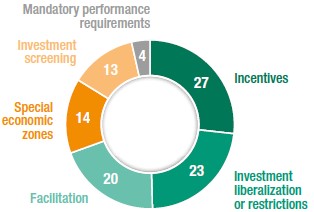Industrial policies have become ubiquitous, UNCTAD’s World Investment Report 2018: Investment and New Industrial Policies finds. Over the past 10 years, at least 101 economies across the developed and developing world (accounting for more than 90% of global GDP) have adopted formal industrial development strategies. The last five years have seen an acceleration in the formulation of new strategies.
UNCTAD’s survey shows that modern industrial policies are increasingly diverse and complex, addressing new imperatives, such as global value chain integration and upgrading, the knowledge economy, build-up of sectors linked to the Sustainable Development Goals and competitive positioning for the new industrial revolution.
“The new industrial revolution is already affecting cross-border investment patterns. Investment policies must adapt as part of new industrial development strategies,” UNCTAD Secretary-General Mukhisa Kituyi said.
Some 40% of industrial development strategies contain vertical policies for the build-up of specific industries. Just over a third focus on horizontal competitiveness-enhancing policies designed to catch up to the productivity frontier. And a quarter focus on positioning for the new industrial revolution.
About 90% of modern industrial policies stipulate detailed investment policy tools, mainly incentives and performance requirements, special economic zones (SEZs), investment promotion and facilitation and, increasingly, investment screening mechanisms.
Modern industrial policies are a key driver of investment policy trends. More than 80% of investment policy measures recorded by UNCTAD since 2010 are directed at the industrial system (manufacturing, complementary services and industrial infrastructure), and about half of these clearly serve an industrial policy purpose.
The report suggests that the new industrial revolution requires a strategic review of investment policies for industrial development. It advises policymakers to keep investment policy instruments up-to-date by re-orienting investment incentives, modernizing SEZs, retooling investment promotion and facilitation, and developing smart mechanisms for screening foreign investment.
Figure 1 Investment policy measures for industrial policy purposes, by type, 2010–2017
(Per cent of total, n = 387)
Source: UNCTAD, World Investment Report 2018.
Note: Some policy measures are categorized under more than one type.
Press Release
For use of information media - Not an official record
UNCTAD/PRESS/PR/2018/016 WIR-Adoption of new industrial policies accelerates in response to economic shift, United Nations reports
Geneva, Switzerland, 6 June 2018



